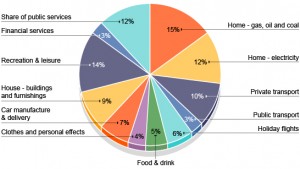What is a carbon footprint?
A carbon footprint measures the impact a person, household, product or business has on the environment. It measures units of carbon dioxide, methane, nitrous oxide and other gases. These are known as greenhouse gases. It calculates all the total greenhouse gases we are expected to produce in all our activities. FACT: The world average is about 4,000 kg of carbon dioxide per person. In the UK it is nearly 10,000 kg per person!
Pie chart showing a break down of a typical persons footprint:

(Data Source & Image Credit: BBC)
A carbon footprint is made up of two elements, a primary and secondary footprint. The primary footprint relates to the direct carbon dioxide emissions of burning of fossil fuels, for example; domestic energy consumption.
The secondary footprint relates to indirect emissions such as manufacturing of products, services and food an individual or business consumes. Why should it matter to you? To put it bluntly, greenhouse gases are the driving force behind global warming and tearing a hole in the ozone layer. This raises the global temperature and causes harmful UV rays to enter the Earth’s atmosphere. This leads to melting polar ice caps causing a rise in sea levels, flooding, and loss of human and animal life. So you see, it really does matter and you can do your bit to help.
How can you reduce yours?
There are so many things you can do to reduce your own carbon footprint and if you really wanted to, you could go the whole hog and go vegan (pardon the pun!). But, we are going to give you a few simple ways to make an instant impact on your footprint, starting today.
- Heating & hot water – turning it down by 1 degree could cut your heating bills by up to 10 per cent and save you around £85 a year as well as reduce your footprint. Updating your boiler to a more energy efficient one will have a big impact on energy consumption too.
- Appliances – avoid leaving appliances on stand-by as they still use energy in this mode. Make sure you chose appliances with good energy ratings
- Utilities – look at switching to a new energy supplier, this will not only save you money but you may also get discounts for receiving paperless bills as this reduces costs for the supplier, and is good for the environment.
- Saving water –About 15 per cent of a typical gas heated household's heating bill is from heating the water for showers, baths and hot water from the tap. This is on average about £80 a year. (Data Source: Energy Savings Trust). Reducing the amount of water you use will reduce your bill, energy use and the impact on the environment.
- Lighting – simply turning off lights when you’re not using them can help matters but also changing from normal light bulbs to either LED or CFL bulbs will make an even bigger difference.
- Smart meters – these are a great way to monitor energy use throughout your home and eliminates the need for the physical meter reading process. By understanding your energy consumption you can adapt the way you use energy to help reduce usage and therefore help reduce your carbon footprint AND save money!
Carbon foot print calculator
There are so many more ways to reduce your carbon footprint and a variety of resources available online. We love this carbon footprint calculator from the WWF. Why not make a change, starting today? http://footprint.wwf.org.uk


 What is Part P and why do you need to know about it?
Part P is an important element of the Building Regulations, which...
What is Part P and why do you need to know about it?
Part P is an important element of the Building Regulations, which...